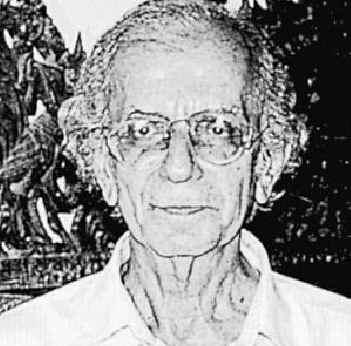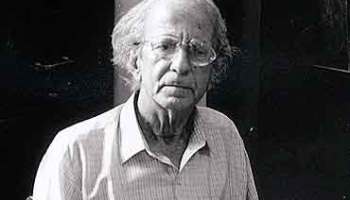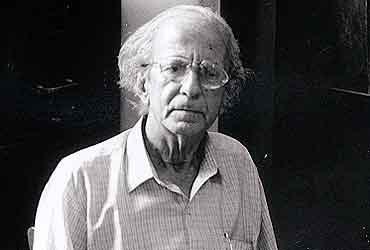The Professor: Analysis
This poem is written in the form of a monologue. This means that there is only a single speaker in the poem, and he speaks to someone who listens to him silently, never once responding to his comments or queries with any words. Here it is only Professor Sheth who speaks and never his former student. The diction that the professor uses would be quite unusual for native English speakers, but it is very common for Indian speakers of English. Ezekiel has deliberately used such diction to mimic and parody the way in which most Indians speak English.
Ezekiel often satirizes Indian English in his poetry, as seen here and in another poem such as ‘Goodbye Party for Miss Pushpa T. S.’ What is also remarkable about this poem is the way in which Ezekiel has focused on the generation gap in the form of the professor’s realization. While speaking to his former student, the professor realizes that times have changed drastically since his youth and his old age and that such changes are happening at an alarmingly fast rate.
Even though the professor is old-fashioned and doesn’t have the best sense of humor, he is quite endearing in his own way. He speaks in a rather uninhibited fashion. He also doesn’t hesitate to stop in the street to talk to a man who had been his student years ago. Perhaps this episode is drawn from Ezekiel’s own life. As we know, both Ezekiel and his father had been eminent professors in their own time. So meeting former students would have been an altogether too common experience for them, especially since they had lived the majority of their lives in Bombay, which is where they had taught as well. Perhaps Ezekiel cherished his memories of meeting his own or his father’s students fondly, and that is why he has written this poem to commemorate such memories.
The Professor: Annotations
Please note: N= noun, V=verb, Adj=Adjective, Adv=Adverb, P=Preposition
Professor (N): A university teacher
Retired (V): Past tense of the word “retire,” that is, to leave one’s job and cease to work, typically on reaching the normal age for leaving service.
Settled (V): Past participle form of the word “settle,” that is, to adopt a more steady or secure style of life, especially in a permanent job and home
Black sheep: A member of a family or group who is regarded as a disgrace to it
Issues (N): Plural form of the word “issue,” that is, children of one’s own
Progress (N): Development towards an improved or more advanced condition
Values (N): Plural form of the word “value,” that is, principles or standards of behavior; one’s judgment of what is important in life
Leaps (N): Plural form of the word “leap,” that is, a forceful jump or quick movement
Bounds (N): Plural form of the word “bound,” that is, a leaping movement towards or over something
Rarely (Adv): Not often; seldom
Price (N): An unwelcome experience or action undergone or done as a condition of achieving an objective
Aches (N): Plural form of the word “ache,” that is, a continuous or prolonged dull pain in a part of one’s body
Diabetes (N): A disorder of the metabolism causing excessive thirst and the production of large amounts of urine
Sound (Adj): Based on a valid reason or good judgment
Weight (N): i) The heaviness of a person or thing
ii) The ability of someone or something to influence decisions or actions
Consequence (N): Social distinction
Humble (Adj): (Of a thing) of modest pretensions or dimensions
Residence (N): A person’s home, especially a large and impressive one
The Professor: Poetic Devices
Rhyme scheme:
The poet does not follow any identifiable rhyme scheme in this poem.
Rhetorical devices:
Apostrophe:
This rhetorical device is used when a poet addresses his or her poem to an absent audience. In this poem, the poet uses the device of an apostrophe when the narrator directs all his words to a former student of his whom we do not see at any point in the poem.
Metaphor:
This rhetorical device is used when a covert comparison is made between two different things or ideas. In this poem, the poet uses the device of metaphor in line 29 when the narrator compares becoming 100 years old with scoring 100 runs in cricket.
Simile:
This rhetorical device is used when an overt comparison is made between two different things. In this poem, the poet uses the device of simile in line 30 when the narrator compares how his student looked when he or she was young with a stick and also uses the word “like” while making this comparison.
The Professor: Central Idea
Professor Sheth, who had once taught geography and has now retired, encounters a former student of his on the road and stops to have a pleasant conversation with him. He tells the student and his own health and inquires about the student’s health as well. He speaks about both their children. He reminisces about how thin the student had been and how he has gained weight and importance since then. Finally, Professor Sheth invites his former student to visit his house one day.
The Professor: Theme
Satire on Indian English: Ezekiel satirizes the way in which Indians speak in English through this poem. This is noticeable in the use of present continuous tense, where simple present tense should be the norm. For example, the professor says, “I am going out rarely,” when he could have just said, “I go out rarely.” The professor also often omits certain parts of speech while speaking. That is why he says “I am not against” instead of saying “I am not against it” or “Every family must have black sheep” instead of “Every family must have a black sheep.” His phrases are repetitive, as in “Our progress is also progressing,” and he uses such formal and outdated words as “issues” in place of “children.” Even his puns are centered on the use of language, such as when he compares reaching the age of 100 with scoring a century or when he uses the double meaning of the word “weight” to make a joke. Ezekiel is masterful in observing these peculiarities of Indian English and transferring them effortlessly into his poetry. They make his poems humorous and enjoyable to read.
Generation gap: Professor Sheth realizes that many changes have happened since he was a young man and after his retirement. In his generation, it was quite common to have a large number of children. However, in subsequent generations, that number had reduced as a result of the use of birth control. Moreover, India has become more and more advanced in terms of technological and scientific innovations. All this is happening so fast that he cannot even keep track of all the progress. This does not sadden him, though. He does not seem to e especially affected by it. He accepts it as a fact of life that is out of his control, and so he is indifferent to it.
The Professor: Tone
The tone of the professor’s voice is mostly cheerful and optimistic throughout this poem. Only at one point does it lose its cheer slightly, and that is when he is talking about his third son, whom he calls the black sheep of the family. There is also a note of passive resignation with respect to the changes that are happening in the world. He knows that the values that had been cherished in his own time are losing currency now, but that cannot be helped, so he accepts it. Otherwise, the professor is glad that both he and his student are in sound health and that their children are doing well. In the end, when he invites his former student to his house, we can, in fact, imagine him doing so with a smile on his face.
Even though the professor mentioned in the title of this poem speaks in such a strange dialect of English, and he seems to be rather old-fashioned, readers cannot help but love him. They admire him for his indomitable spirit, which has kept up his health, as well as his love for his students that makes him stop to talk to one, and that, in fact, is what gives rise to this poem itself. Ezekiel is known for creating such essentially Indian and loveable characters, and Professor Sheth is no exception.
Some online learning platforms provide certifications, while others are designed to simply grow your skills in your personal and professional life. Including Masterclass and Coursera, here are our recommendations for the best online learning platforms you can sign up for today.
The 7 Best Online Learning Platforms of 2022
- Best Overall: Coursera
- Best for Niche Topics: Udemy
- Best for Creative Fields: Skillshare
- Best for Celebrity Lessons: MasterClass
- Best for STEM: EdX
- Best for Career Building: Udacity
- Best for Data Learning: Pluralsight










